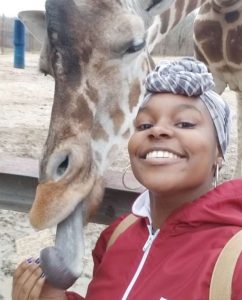A year into her collegiate career at the University of Missouri, Brandy Williams found herself walking through the Anheuser-Busch Natural Resources (ABNR) Building looking for someone to talk to about her future. At the time, Williams was majoring in animal sciences. While she appreciated the expertise within the program, Williams was looking for something a little bit different.
She happened to run into Sarah Humfeld, who, at the time, was an academic advisor in the College of Agriculture, Food and Natural Resource (CAFNR). Humfeld, who is currently the assistant director of the office of undergraduate research, encouraged Williams to look at the natural resource science and management degree program – specifically in fisheries and wildlife.
“She told me to look at the courses for that degree program and see if they looked like something I would be interested in,” Williams said. “She said she wasn’t telling me to switch majors but that there were definitely some other options out there.”
After a review of the courses, Williams, now a senior, decided to make the switch to natural resource science and management.
“It’s been incredible, as I didn’t even know something like fisheries and wildlife existed,” said Williams, who is from St. Louis, Mo. “It’s also a bit funny. Growing up, I never really had any experiences with wildlife. No one in my family hunts or hikes or anything like that. But I’ve always had this innate thing that drew me to animals and wildlife in general.”
The natural resource science and management degree program opened doors for Williams to connect with wildlife in a unique way – and several research opportunities deepened that connection. Williams has participated in undergraduate research since her sophomore year. She is currently a Maximizing Access to Research Careers (MARC) / Initiative for Maximizing Student Diversity (IMSD) Program Fellow as well. MARC/IMSD integrates academic and social support with mentoring and paid research opportunities that prepares underrepresented students to matriculate into research-focused graduate programs.

“Without research, I really wouldn’t know what I would want to do,” Williams said. “I started out my collegiate career with the mindset of being a veterinarian because that’s all I was ever exposed to. If I was going to work with animals, I felt like my options were being a vet or a zookeeper. Being exposed to research helped me find a path that I’m very passionate about. Research is definitely for me – this is what I want to do.”
Williams’ current research project focuses on grassland birds’ roles in seed dispersal in Missouri prairies and how it can help restore prairies in the state. She is working with Lauren Sullivan, an assistant professor of biological sciences. Williams has also conducted research with Reginald Cocroft, professor of biological sciences, and Samniqueka Halsey, an assistant professor in the School of Natural Resources. She has researched treehoppers as well as ticks.
“We have so many great faculty who have different experiences,” Williams said. “It’s really nice to be able to talk with professors who have been through what I’m going through – they didn’t have those opportunities growing up, but they found research and now they run their own labs. I have other professors who have lived what they teach their entire lives, which is also super interesting to hear about. It’s a great mix and it’s interesting to get those different perspectives.”
The research that Williams has conducted touches on the research section of the RISE Initiative. The RISE Initiative states that all CAFNR undergraduate students will take part in at least one signature experience while on campus: Research, International, Service Learning and Experiential Learning. The RISE experiences prepare students for the real-world by giving them opportunities outside the classroom to learn in different ways.
Along with her research, Williams was previously involved with the University of Missouri Herpetological Society. She was able to communicate science to a variety of people through the club.
“That experience was a lot of fun,” Williams said. “Not all snakes and lizards are scary, and it’s fun to share that with kids and adults alike. The club even inspired me to buy my own gecko. The work also played a big role in what I want to eventually do with my PhD. I’ve always loved wildlife, but it’s taken a bit to decide which species I want to work with. Through the Herpetological Society and a really interesting ornithology course, I’ve decided I would really like to work in either of those spaces.”
Williams will graduate in May and has started applying to a few PhD programs. Her goal is to pursue a graduate degree in animal behavior.
“I love research, and I’m excited to take the next step and dive into research that I’m really passionate about,” Williams said. “Research is all about asking questions. I’ve always loved asking questions growing up – and now I have the opportunity to ask questions and work with animals. It’s a great combination and a culmination of my interests.”
In addition to continuing to pursue her passions in research, Williams is hoping to showcase to a younger minority generation that there are multiple careers related to wildlife.
“I love research, but one of my biggest goals is to try to be that person who advocates for minoritized students in STEM, especially women,” Williams said. “I want to use whatever I end up doing to get more Black women in the wildlife biology field. We’re definitely out there. I didn’t learn about research until my sophomore year of college, which is way too late. I was able to make it work, but I really want to be able to go back and share with others the viable options if they’re interested.”